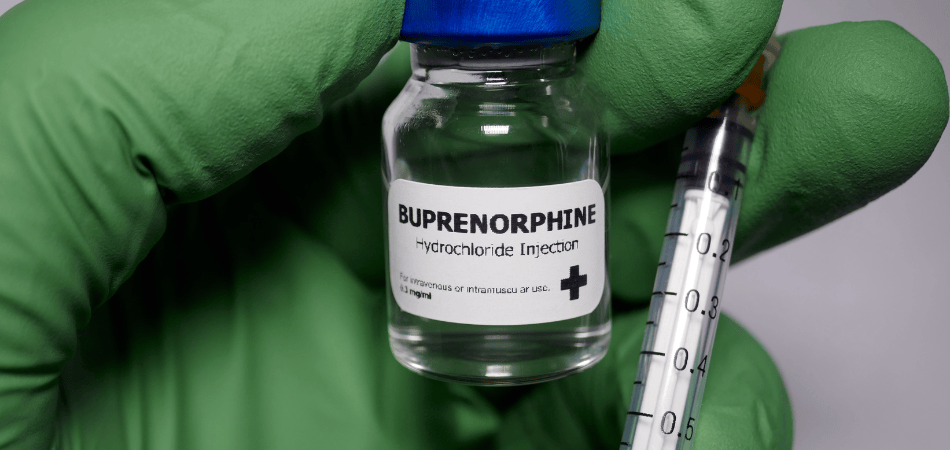
Written by:

Medically Reviewed by:
Last Updated:
February 14th, 2025
Buprenorphine Addiction
What is buprenorphine?
Buprenorphine is a prescription medication primarily used to treat opioid addiction by easing withdrawal symptoms and reducing cravings. It works as a partial opioid agonist, meaning it activates opioid receptors in the brain but to a lesser degree than drugs like heroin or methadone, helping prevent misuse and dependency.
In the UK, buprenorphine is classified as a controlled substance under Schedule 3 of the Misuse of Drugs Regulations, making it illegal to possess without a prescription. It’s often given as part of a structured treatment plan in medical settings, where it helps people gradually step away from stronger opioids while managing withdrawal more comfortably.
Is buprenorphine addictive?
Buprenorphine can be addictive, even though it’s classed as having a moderate to low risk of dependency. While it’s typically prescribed to help with opioid addiction, buprenorphine still affects the brain’s opioid receptors, meaning it can create feelings of mild euphoria and relief. For some, especially those already battling addiction, this effect can be appealing.
Buprenorphine binds to opioid receptors but has a ‘ceiling effect,’ so after a certain dose, its effects don’t increase. This makes it safer than many opioids, lowering the risk of severe respiratory issues. But it still causes the brain to release dopamine, which can lead to a psychological dependency if it’s misused, as people might start relying on it for stress relief or comfort.
Over time, the body can get used to buprenorphine, leading to physical dependency. If someone suddenly stops, withdrawal symptoms can kick in, from flu-like discomfort to strong cravings. This potential for both physical and mental reliance means buprenorphine should be used carefully, ideally under medical guidance, to support recovery rather than create new challenges.
How can a buprenorphine addiction form?
It can be confusing to come to terms with the fact that a drug like buprenorphine can itself become addictive. Buprenorphine’s role is to support recovery and improve quality of life, so realising it can lead to dependency is often difficult to accept.
In fact, there are a few ways someone might develop an addiction to buprenorphine. Understanding these pathways can help you or someone you care about recognise signs of dependency before it becomes a larger issue.
1. Misusing prescribed dosages
When buprenorphine is prescribed, it’s essential to follow the exact dosage instructions, as exceeding the prescribed amount can lead to dependency. Increasing the dose without medical guidance may amplify feelings of relaxation or well-being, which can then create a psychological attachment to the drug. Over time, this misuse can shift from occasional to frequent, setting the foundation for addiction.
2. Using buprenorphine recreationally
In some cases, people might be introduced to buprenorphine recreationally, using it without a prescription. Because of its effects, buprenorphine may provide a sense of calm or mild euphoria, making it attractive for recreational use. However, this approach bypasses medical supervision, raising the risk of both physical and psychological dependency and making it hard to stop.
3. Prolonged use in pain management
Buprenorphine is sometimes prescribed to help with chronic pain management, especially for those who might not respond well to other opioids. However, with long-term use, the body can start relying on the drug to regulate discomfort, and this can gradually lead to dependency. When buprenorphine is taken over extended periods, stopping can trigger withdrawal symptoms, making it harder to quit.
4. Psychological dependence in opioid recovery
For those using buprenorphine as part of opioid use disorder recovery, the drug becomes a critical support for overcoming past addictions. However, over time, some may begin to rely on it psychologically, associating it with the stability and normalcy it helps create. This mental reliance, though different from physical addiction, can still be powerful, leading to an ongoing need for the drug.
What are the signs of buprenorphine addiction?
Recognising the signs of buprenorphine addiction is crucial, whether you’re concerned about yourself or a loved one. Spotting the signs early on can make all the difference: the sooner a problem is identified, the sooner help can be provided.
Physical signs
- Drowsiness or sedation: A common effect, even when buprenorphine is taken as prescribed
- Constipation: Frequent use can slow down the digestive system, leading to constipation
- Slurred speech: Buprenorphine affects central nervous system activity, which can impact speech
- Withdrawal symptoms: When not taking the drug, users may experience muscle pain, insomnia, sweating and other withdrawal symptoms
- Tolerance: Needing increasingly higher doses to feel the same effects signals a growing dependence
Psychological signs
- Cravings: An overpowering need or desire to use buprenorphine, even if it’s no longer medically required
- Anxiety or paranoia: Mood changes can develop as addiction takes hold, leading to higher levels of stress or worry
- Depression: Feelings of sadness or hopelessness may appear, often exacerbated by dependency
- Memory issues: Buprenorphine can cause cognitive impairments, affecting memory and concentration
- Loss of interest: A person may lose interest in hobbies or activities they once enjoyed, focusing on buprenorphine use instead
Behavioural signs
- Doctor shopping: Visiting multiple doctors to obtain additional prescriptions is a common behavioural sign (in countries with a privatised health care system)
- Neglecting responsibilities: Personal, professional or familial obligations may be ignored as drug use becomes a priority
- Isolation: People may withdraw from loved ones to hide their dependence or because they feel misunderstood
- Increased secrecy: Users might start hiding pills, lying about their usage or concealing how often they take buprenorphine
- Financial difficulties: Dependency can lead to spending excessive amounts on buprenorphine, even when funds are tight
Can Liberty House help me with Buprenorphine addiction?
At Liberty House, we understand how challenging it can be to face dependence on buprenorphine. If you’ve noticed yourself becoming reliant on this medication or if you’ve been taking it for some time and want to detox safely, we’re here to support you each step of the way.
Detox from buprenorphine can be a difficult journey, and we offer a medically monitored detox programme that ensures your comfort and safety throughout. Our team is available 24/7 to provide medical care and ease withdrawal symptoms as much as possible, making the experience as manageable as it can be.
After detox, we move into therapy tailored to your unique journey. Our therapeutic options include traditional methods, like one-to-one counselling and group therapy, as well as holistic practices, such as yoga and art therapy. These therapies allow you to explore the reasons behind your dependence and build a strong foundation for recovery.
Finally, we believe that support shouldn’t end after rehab. Our aftercare programme is designed to help you transition smoothly back into daily life, ensuring you have a reliable network to keep you on the path to long-term recovery.
At Liberty House, you’re not alone—our compassionate team is ready to help you overcome buprenorphine dependence, one step at a time. Contact us today to begin your life without buprenorphine.







